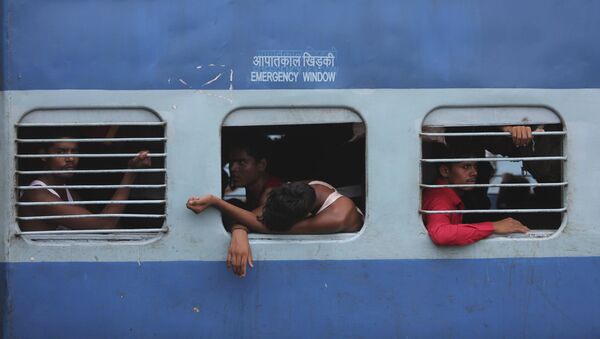Under such circumstances, the Indian Railways on Tuesday officially announced that they are ready to convert 20,000 train coaches into isolation wards. Overall, the wards would have a capacity to hold 320,000 coronavirus patients or those suspected of having COVID-19 for quarantine.
“Work on modification of the first 5,000 coaches, which are to be converted initially into quarantine or isolation coaches has already started. These 5,000 coaches would be having capacity to accommodate up to 80,000 beds. One coach is expected to have 16 beds for isolation", informed the federal Railway Ministry headed by Piyush Goyal.
The coaches, with specially modified sanitation facilities, proper electrical supply, and ideal insulation would be monitored by a team of doctors, paramedics, and nurses.
All the necessary medical equipment, bedside tables, bottle holders – every important detail suggested by health experts have been incorporated in their train coached-turned-isolation wards.
Earlier last week, pictures of a prototype isolation ward designed by the Indian Railways made their way to social media.
Isolation coaches built by Indian Railways to fight the #CoronavirusPandemic.
— Shruthi Thumbri 🇮🇳 (@Shruthi_Thumbri) March 28, 2020
Waw! Great move @PiyushGoyal ji !! 👏#IndiaFightsCorona pic.twitter.com/SV5ZK0bHvp
Netizens have shown their appreciation for the preparedness and measures being taken by Indian Railways.
India, meanwhile, has entered day six of its 21-day national lockdown imposed by Prime Minister Narendra Modi as a precaution against the further spread of the coronavirus. Except for the police, media, and healthcare officials – everybody has been asked to stay indoors until 14 April.
In contrast to upper middle class and middle class Indians, the precautionary measures have hit the poorer sections of society the hardest. It is namely daily wage workers, rag pickers, and those who do odd jobs that are really feeling the pinch. Having temporarily lost their employment due to the lockdown, these migrant workers are now travelling back to their hometowns.
This comes at a time when Prime Minister Modi has emphasised pracitising strict “social distancing”.
Several slum areas in India are still unhygienic and dwellers, unaware about the severity of the situation are still living without masks and soap.
Analysts have warned that it is these groups of citizens who could spell doom for India if awareness does not reach them.
Currently, India has 1,251 active cases of COVID-19, along with 32 recorded deaths.


